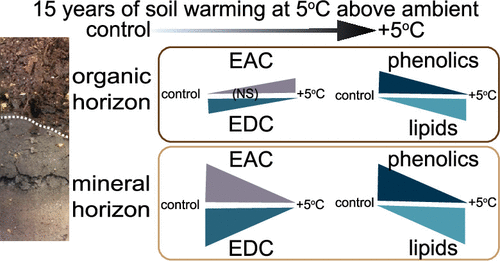当前位置:
X-MOL 学术
›
Environ. Sci. Technol. Lett.
›
论文详情
Our official English website, www.x-mol.net, welcomes your
feedback! (Note: you will need to create a separate account there.)
Long-Term Warming Decreases Redox Capacity of Soil Organic Matter
Environmental Science & Technology Letters ( IF 8.9 ) Pub Date : 2020-11-25 , DOI: 10.1021/acs.estlett.0c00748 Rachelle E. LaCroix 1 , Nicolas Walpen 2 , Michael Sander 2 , Malak M. Tfaily 3 , Jeffrey L. Blanchard 4 , Marco Keiluweit 1
Environmental Science & Technology Letters ( IF 8.9 ) Pub Date : 2020-11-25 , DOI: 10.1021/acs.estlett.0c00748 Rachelle E. LaCroix 1 , Nicolas Walpen 2 , Michael Sander 2 , Malak M. Tfaily 3 , Jeffrey L. Blanchard 4 , Marco Keiluweit 1
Affiliation

|
Globally rising temperatures increase microbial activity, accelerating decomposition of soil organic matter (SOM). SOM has numerous functional capabilities, of which the capacity to engage in reduction–oxidation reactions (or redox capacity) affects nearly all soil biogeochemical processes. How warming-induced microbial decomposition affects the redox capacity of SOM and its functional role in biogeochemical processes is largely unknown. We examined the impact of 15 years of in situ soil warming on the redox capacities of water-extractable organic matter (WEOM). Combining mediated electrochemical analysis with high-resolution mass spectrometry, we assessed the molecular basis for changes in the redox capacities of WEOM within heated (5°C above ambient) and non-heated organic and mineral temperate forest soils. Chronic soil warming significantly decreased both concentrations and inherent electron-accepting and -donating capacities of WEOM, particularly in the mineral soil. This decline was best explained by decreases in the relative abundance of aromatic and phenolic compounds, suggesting that enhanced microbial decomposition of redox-active moieties caused the decrease in redox capacity. Our findings suggest that global warming not only diminishes the size of the soil carbon reservoir but might also negatively alter the ability of SOM to participate in critical redox processes such as microbial respiration, nutrient cycling, or contaminant degradation.
中文翻译:

长期升温会降低土壤有机质的氧化还原能力
全球升高的温度提高了微生物活性,加速了土壤有机质(SOM)的分解。SOM具有多种功能,其中参与还原-氧化反应的能力(或氧化还原能力)几乎影响所有土壤生物地球化学过程。变暖诱导的微生物分解如何影响SOM的氧化还原能力及其在生物地球化学过程中的功能作用尚不清楚。我们研究了15年现场测试的影响土壤变暖对水可提取有机物(WEOM)的氧化还原能力的影响。结合介导的电化学分析和高分辨率质谱,我们评估了加热(高于环境温度5°C)和非加热有机和矿物温带森林土壤中WEOM氧化还原能力变化的分子基础。慢性土壤变暖显着降低了WEOM的浓度以及其固有的电子接受和供体能力,特别是在矿质土壤中。下降的最好解释是芳香族和酚类化合物的相对丰度降低,这表明增强的氧化还原活性部分的微生物分解会导致氧化还原能力的降低。
更新日期:2020-11-25
中文翻译:

长期升温会降低土壤有机质的氧化还原能力
全球升高的温度提高了微生物活性,加速了土壤有机质(SOM)的分解。SOM具有多种功能,其中参与还原-氧化反应的能力(或氧化还原能力)几乎影响所有土壤生物地球化学过程。变暖诱导的微生物分解如何影响SOM的氧化还原能力及其在生物地球化学过程中的功能作用尚不清楚。我们研究了15年现场测试的影响土壤变暖对水可提取有机物(WEOM)的氧化还原能力的影响。结合介导的电化学分析和高分辨率质谱,我们评估了加热(高于环境温度5°C)和非加热有机和矿物温带森林土壤中WEOM氧化还原能力变化的分子基础。慢性土壤变暖显着降低了WEOM的浓度以及其固有的电子接受和供体能力,特别是在矿质土壤中。下降的最好解释是芳香族和酚类化合物的相对丰度降低,这表明增强的氧化还原活性部分的微生物分解会导致氧化还原能力的降低。











































 京公网安备 11010802027423号
京公网安备 11010802027423号